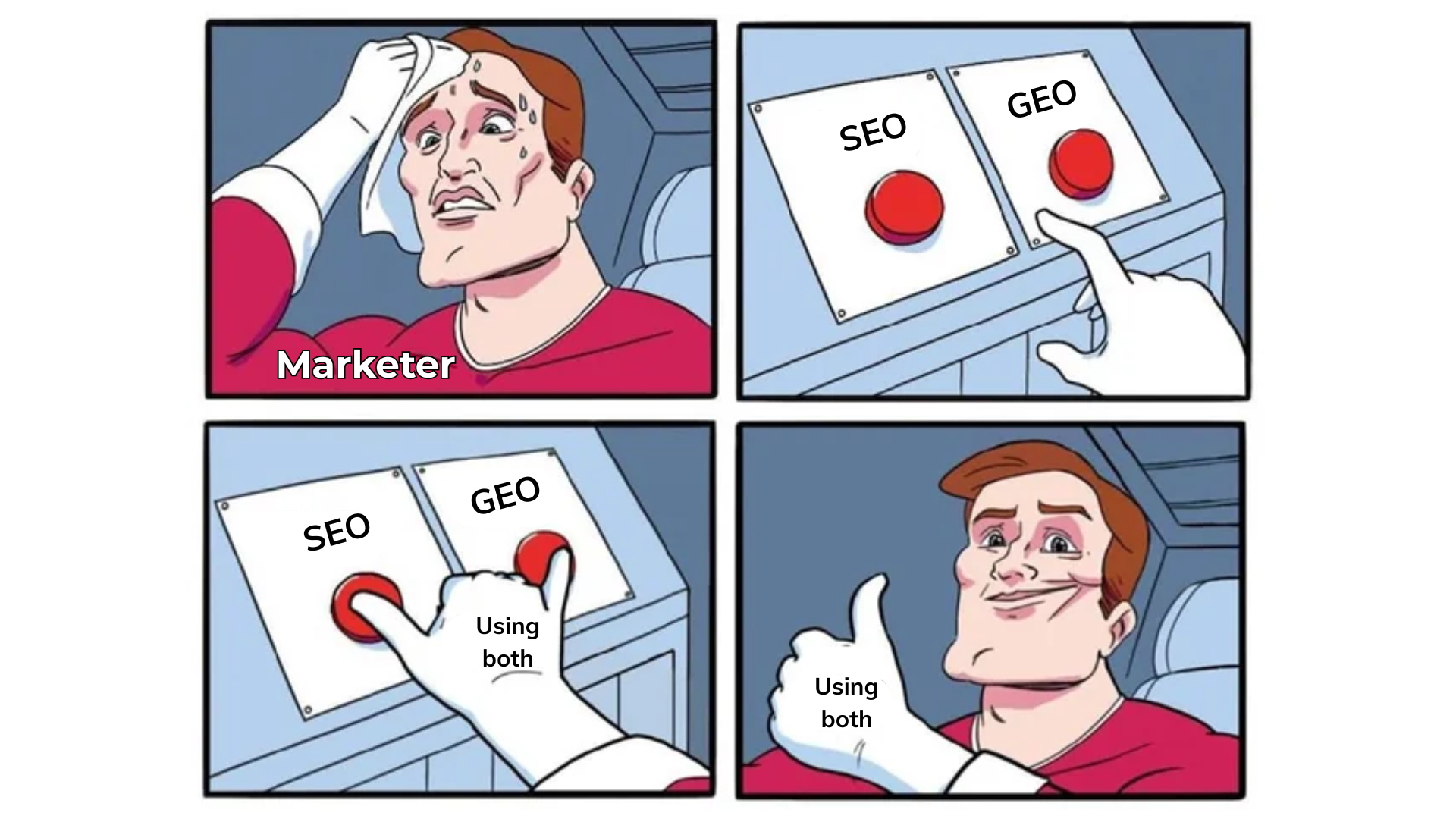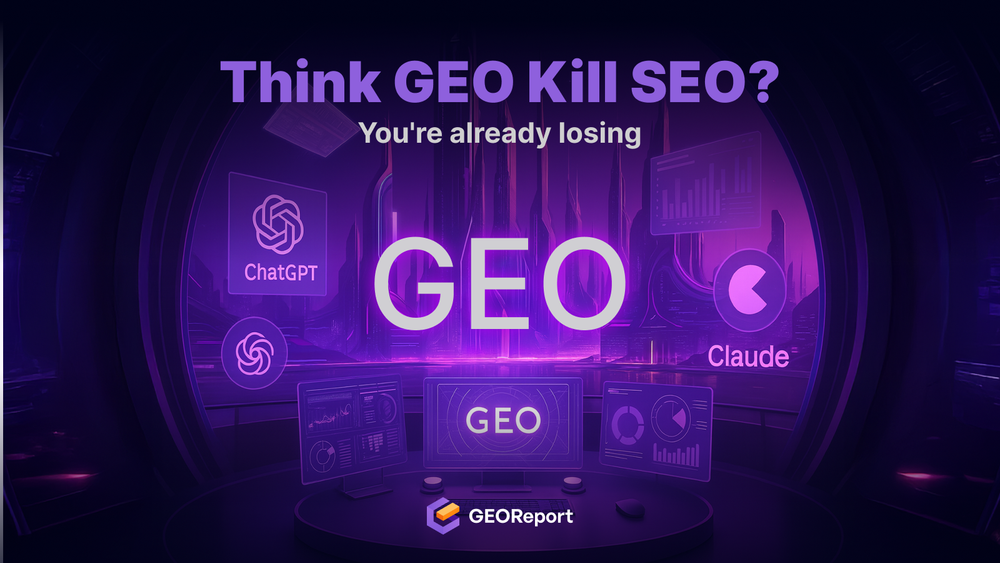BLUF:
The answer is no. Generative Engine Optimization (GEO) will not replace SEO. It’s how AI now evaluates SEO. Anyone saying otherwise misunderstands how visibility, authority, and traffic truly scale in the AI era. Search and generative discovery are merging. and brands that fail to integrate both will lose trust on both sides.
Why Do So Many People Claim GEO Will Replace SEO?
Because hype spreads faster than comprehension. When GEO became a buzzword in 2024, a wave of shallow “future of search” posts flooded LinkedIn and Medium most of them wrong.
For example, this Medium article claimed:
“SEO is dying. GEO is the next evolution that will make Google obsolete.”
That’s not bold. that’s technically false. Even Google’s Search Generative Experience (SGE) relies on classic SEO signals like crawlability, content freshness, and backlink trust as foundational data for its AI layer. You can’t replace the infrastructure that trains the model itself.
Fact check: AI engines don’t generate authority out of thin air, they inherit it from the web. And the web still runs on SEO.
Even Search Engine Journal and Search Engine Land confirm that SEO signals directly influence AI-generated results and summaries. So the “GEO kills SEO” narrative isn’t visionary, it’s just misinformed clickbait.
So What Is GEO Actually Doing?
GEO doesn’t destroy SEO. It interprets it through the lens of AI reasoning.
Before, SEO worked like a formula: Keywords + backlinks + CTR = ranking.
Now, GEO adds a new interpretive layer: semantic understanding + credibility weighting + entity mapping.
| SEO Focus | GEO Focus |
|---|---|
| Ranking in search results | Being cited and recommended by AI engines |
| Keywords and backlinks | Meaning, E-E-A-T, and structured data |
| Metadata and crawlability | Contextual clarity and cross-platform authority |
| Clicks and conversions | AI citations and trust propagation |
So no! GEO doesn’t eliminate SEO. It’s how AI measures whether your SEO strategy still makes sense to humans.
Why “GEO Will Replace SEO” Is Technically Wrong?
Search and generative engines share the same backbone. Google’s SGE, Bing Copilot, ChatGPT Search, and Perplexity all start with index-based retrieval before generating their natural language summaries.

Their architecture includes: Crawlers → Indexers → Retrievers → Re-rankers → Generators. GEO lives at the final stage: re-ranking by trust. In other words, they still crawl your website just like Googlebot does.
Even Gartner’s 2025 Digital Visibility Framework states:
“Generative search systems continue to rely on traditional ranking signals to assess authority before integrating results into AI outputs.”
That means GEO isn’t a new planet. It’s the atmosphere around SEO. If your SEO collapses, GEO visibility dies instantly. If your site isn’t crawlable, AI can’t even see you.
Bottom line:
Anyone claiming GEO will “replace” SEO either doesn’t understand how search pipelines work or is trying to sell vaporware.
Can GEO and SEO Actually Work Against Each Other?
At first, yes, if you don’t understand how to balance them. Early GEO practitioners often overcorrect:
- Writing conversationally but losing keyword clarity.
- Ignoring metadata and schema for the sake of tone.
- Treating “AI readability” like a replacement for “SEO readability.”
That’s like optimizing for ChatGPT while forgetting Google still drives your traffic.
Example:
A brand writes “How can I find the perfect budget-friendly running shoes in America?” (great for GEO), but fails to tag it with Product, Brand, and Offer schema. Result: invisible to both search and AI engines.
The solution is balance, what we call GEO-informed SEO. Write like a human. Structure like a machine.
What Happens When You Scale Traffic?
This is where the “GEO replaces SEO” theory collapses completely. At scale hundreds of thousands or millions of sessions — GEO and SEO become a closed feedback loop:

- SEO drives traffic.
- Traffic builds brand trust signals.
- AI models detect and validate those trust patterns.
- GEO visibility improves (more citations, higher confidence).
- AI mentions bring new visitors, boosting SEO again.
It’s not rivalry, it’s resonance.
The Trust Loop:
SEO builds visibility → GEO builds credibility → AI amplifies both.
Who’s Really Getting GEO Wrong?
Let’s be direct. The people claiming “GEO > SEO” are often:
- AI tool marketers riding hype cycles.
- LinkedIn influencers recycling buzzwords for engagement.
- SEO agencies that slapped “GEO” onto their existing services.
Example:
“AI Wave Digital” claims that “GEO makes backlinks obsolete.”
But according to Moz’s 2025 Ranking Factors Report,
backlinks still contribute up to 40% of total site authority, and those same backlinks feed AI training data.
So yes, GEO is powerful. But it’s not a replacement. It’s a mirror showing which parts of your SEO survive when AI is the reader instead of a crawler.
What’s the Future Relationship Between GEO and SEO?
Let’s admit: at early stages, they conflict.
- SEO still prefers short, keyword-rich phrasing
- GEO thrives on long, conversational queries
- SEO rewards precision
- GEO rewards context and reasoning
This is why so many early adopters get frustrated. They optimize for ChatGPT-style readability, and suddenly Google traffic tanks. Or they double down on old-school SEO tactics, and AI stops citing them.
But the solution isn’t choosing sides — it’s convergence. Write like you’re talking to a human. Structure like you’re teaching a machine.
The Hybrid Framework (GEO-informed SEO)
- Start with intent: Understand what question your content should answer conversationally
- Layer structured data: Mark up entities, authors, products, or FAQs for AI comprehension
- Validate E-E-A-T: Add credentials, cite sources, include expert bios
- Cross-link internal entities: Build a visible context web — Google and AI both rely on it
- Audit your site with community version, track mentions, not just rankings and get your full plan for your marketing, social campaign: Use tools GEOReport.ai
FAQs
Will SEO die because of AI?
No. Search isn’t dying, it’s evolving. GEO changes how AI interprets SEO signals, not how the web works.
Why do people think GEO replaces SEO?
Because they confuse visibility mechanisms with visibility evaluation. GEO is how AI judges what SEO already created.
How can brands balance both?
Write for humans, structure for machines.
Combine conversational writing, E-E-A-T principles, and schema markup.
What’s the long-term takeaway?
SEO gets you found. GEO gets you trusted.
One without the other is noise.


